Back to: Table of Contents | Chapter 5. The Snavely Years
John Miller, named to succeed Dick Snavely as RLT director, had the credentials for the job. At the time of his selection, he was manager of the National Opera Company of Raleigh and a veteran of 15 years experience in professional theatre. Before moving to Raleigh, he and his wife Helen had appeared in more than 30 musicals in and around New York, mainly at the Paper Mill Playhouse. Miller also was in the cast of the Broadway production of “Destry Rides Again” — along with Tar Heel native Andy Griffith.
In 1964, Miller returned to New York to appear in eight operas with the New York City Opera Company, coming back to Raleigh as program director for WRAL-FM. RLT audiences first saw him in the role of Peachum in “The Threepenny Opera.” He also had appeared with the Triangle Repertory Company in “The Little Foxes” and “The Fantasticks.”
Miller’s first show at RLT was a 1967 summer production of William Saroyan’s “The Time of Your Life,” featuring Robert Connelly, Clarke Fountain, Guy Munger, Eddie Adcock, Allen Berryhill and Roland Lashley. Tom Walters of the N.C. State English faculty reviewed the play for The Anvil and said RLT and director Miller had done “a beautiful job with this jagged nerve-end of a comedy.”
The regular season opened October 18, 1967, with the musical play “Carnival,” featuring John Shearin, Lou Vigneault Dick Vigneault Alan Downing, Glenn Miller, Gordon Kelly and Billie Kelly. “A soundly integrated musical,” said The N&O.
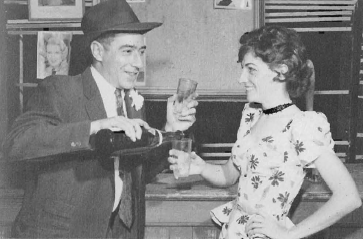
Robert Connelly and Jeannie Johnson in “The Time Of Your Life” (1967-1968)
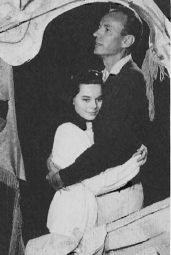
Janet Boyd and Bob Brickell in “Carnival” (1967)
“Dark of the Moon” (opening December 6, 1967) was directed by Harry Callahan with leads played by Brenda Williams and Art Anderson. “The cast is magnificent,” said The News and Observer.
“What Price Glory?” (opening January 31, 1968), directed by John Miller, featured Jimmy Thiem and Dick Vigneault. Local reviewers praised the performance, but said time had taken its toll on the script a story of Marines in World War I.
“A Delicate Balance” by Edward Albee (opening March 27, 1968) featured Bette Elliott, Guy Munger, Jean Van Tilburg, Carol Cohen and Morton Bailey. The reviewers were not kind. Bill Morrison of The N&O referred to Munger’s “gray playing of a gray subject.” The Times said: “They have delivered a very good production; it should have been so much better” and talked about the murkiness of Albee’s script. (A nameless RLT worker who pasted the reviews in a scrapbook, added a personal touch, a quote allegedly from Aristophanes: “It’s too bad the play was over his head.”)
“The Fantasticks” (opening May 8, 1968) got everybody in a happy mood again. The cast included Steve Wall, Margaret Poyner, Bob Brickell, Allen Berryhill, Roland Lashley, Raymond Dew, Eddie Adcock and Hugh Overturf. D.D. Williams, in his review for The N&Q called it “one of the best musicals ever offered to a Raleigh audience.”
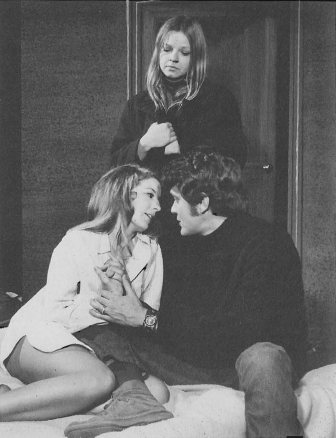
“Dark Of The Moon” (1967-1968)
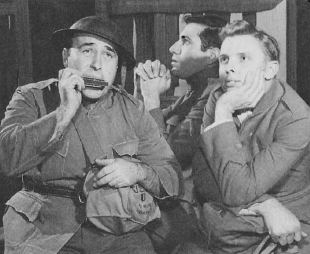
A scene from “What Price Glory?” (1967-1968)
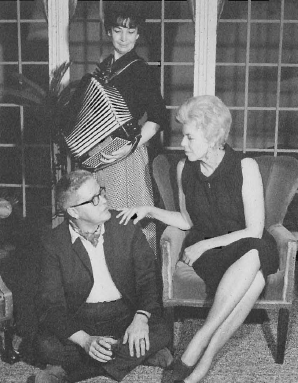
Jean Van Tillburg (standing), Guy Munger and Bette Elliott in “A Delicate Balance” (1967-1968)
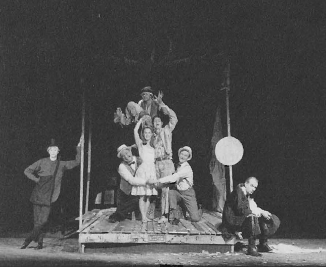
Happily ever-aftering in “The Fantasticks” (1967-1968)
The 1968-69 season opened September 4 with “Bye Bye Birdie,” a musical featuring Mike Silver, Connie Glicken and Scotty Todd. ‘A highly successful opening,” said The Times.
“Hogan’s Goat” (opening October 23, 1968) featured Dick Vigneault and Judy Cobb.
“The Caretaker” by Harold Pinter (opening December 4, 1968) had Robert Brickell, Roland Lashley and Art Anderson in the cast. ‘A superior effort,” said The Times. Harry Callahan directed.
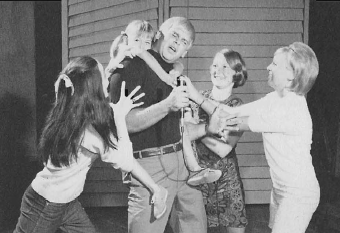
A scene from “Bye Bye Birdie” (1968-1969)
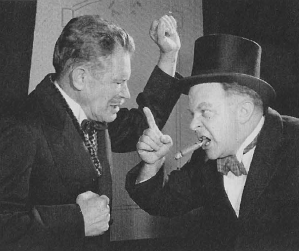
Chuck Wason (left) and Jack Harmon have a not-so-quiet discussion in “Hogan’s Goat” (1968-1969)
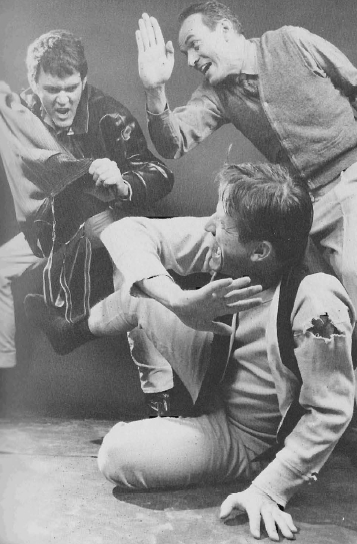
Art Anderson (left), Bob Brickell and Roland Lashley (floor) clash in “The Caretaker” (1968-1969)
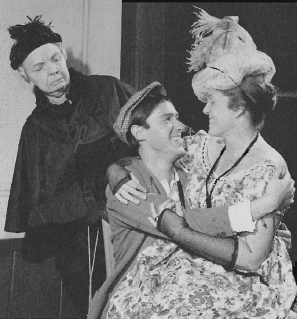
A little romance in “Hogan’s Goat” (1968-1969)
“The Odd Couple” (opening February 5,1969) had Raymond Dew and Jack Harmon in the title roles, with Billie Kelly and Mary Lyman among the supporting cast members.
“Medea” (opening March 19, 1969) featured Margaret Burns in the lead and a cast that included Lorena Gaddy Goodwin, Richard Vigneault, Gurdine Bliss, Lou Vigneault, Jeralee Miller, David Munger, Eric Newman, J. Kelly Gay III, and Tony Federici. Harry Callahan directed, and Milton Bliss supplied an original musical score. The N&O headline on the review: “‘Medea’ Is Magnificent.”
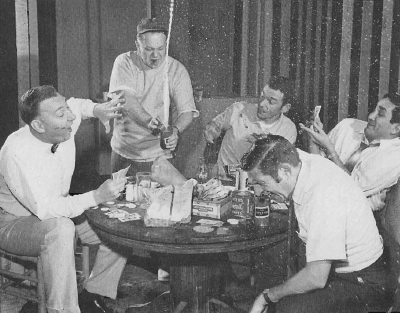
A friendly card game in “The Odd Couple” (1968-1969). Clockwise from left: Tom McCutcheon, Jack Harmon, Stan Serxner, Efrain Segarra and Bob Dean
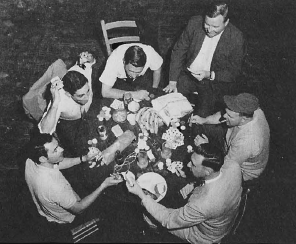
The boys continue their card game in “The Odd Couple” {1968-1969)
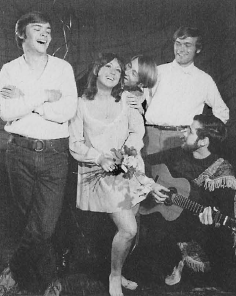
Young love in bloom in “As You Like It” (1968-1969)
RLT leaped from one classic to another, presenting “As You Like It” April 30, 1969, as the season’s finale. Bill Morrison of The N&O praised Miller’s direction as “theatre joyously and lovingly projected.” He then praised individual cast members, adding, ”I’ll stop with Betty Bishop as dumb Audrey, because Betty Bishop as dumb Audrey stopped the show repeatedly. She and [Bob] Brickell [as Touchstone] create a pure burlesque turn, and pure burlesque is as much a joy of Shakespeare as anything else.”
The season of 1969-70 opened September 29 with a rollicking production of Stephen Sondheim’s musical “A Funny Thing Happened on the Way to the Forum,” with Robert Ennis Turoff as guest director. The all-star cast included Harry Dorsett, Joan Munger, Steve Wall, Roland Lashley, Lloyd Hardy, Charles Moseley, Stan Serxner, Zigrida Smith, Sally Rea, Conni Johnson, Kay Richards, Irene Herman, Sonnya Quinn, Katharine Buffaloe, Tony Federici, Keith Ferrell, Greg Gulley and — making a special appearance — none other than the famous fan dancer of the 1933-34 Chicago World’s Fair, Sally Rand, as in “the Rand is quicker than the eye.”
John Miller opened in the leading role of Pseudolus (the part created on Broadway by Zero Mostel), but was injured onstage opening night when another cast member accidentally struck Miller across the throat with a prop sword. Taylor Reed, a New York actor who had played the role in summer stock, was flown in and, after very intensive rehearsals, replaced Miller in the cast. Critics called the show bright and lively.
“Abie’s Irish Rose” (opening November 12, 1969) had in its cast Doris Dworsky, Harvey Gold, Ken Herman, Stanley Serxner, Tony Federici, Judy Hollifield, John Harmon, J Kelly Gay III, and Amanda Miller. It was RLT’s 200th production and set box office records the first week of the run.
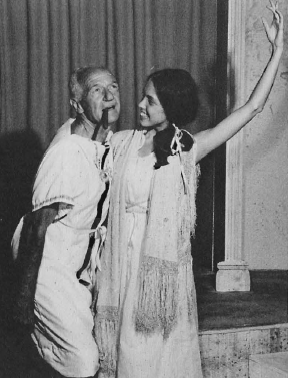
Harry Dorsett and Kathy Buffaloe in a tender moment from “A Funny Thing Happened On The Way To The Forum” (1969-1970)
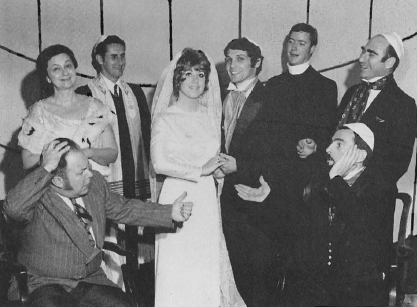
Wedding scene from “Able’s Irish Rose” (1969-1970)
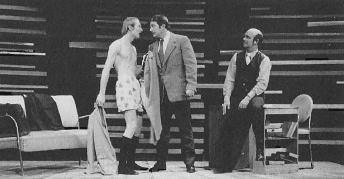
A scene from “You Know I Can’t Hear You When The Water’s Running” (1969-1970)
“You Know I Can’t Hear You When the Water’s Running” (opening December 31), four one-act plays by Robert Anderson, featured Charles Parker, Alton Buzbee, Mary Jeanne Best, Eric Hurley, Betty Dick, Hugh Overturf, Corinne Newman and John Miller (as actor and director). “A thoroughly successful dramatic presentation,” said the North Carolina Anvil.
“The Grass Harp” by Truman Capote (opening February 11, 1970) was directed by Harry Callahan with a cast that included Lorena Goodwin, Gurdine Bliss, Arthur Marcus, Harrel Tice, Sara Jackson, Robert Brickell and Robin Ross. Richard J Dozier of the North Carolina Anvil said the play had a “gratifying lack of pretentiousness.”
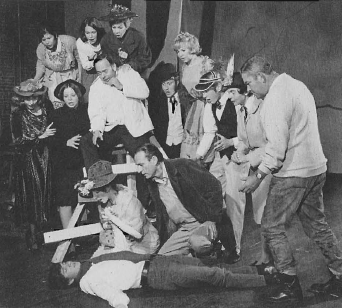
A dramatic moment from “The Grass Harp” (1969-1970)
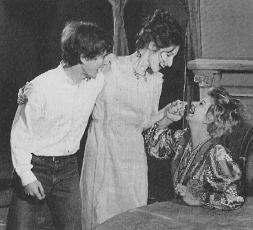
Sharing a laugh in a scene from “The Grass Harp” (1969-1970)
“A Hatful of Rain” (opening April 1, 1970) had Harry Callahan and Sue Scarborough in the leads and was directed by John Miller. Bill Morrison of The News and Observer called it a “crisp and subtle work.”
“Tartuffe” (opening May 13, 1970) had a cast that included Harlan C. Brown, J. Kelly Gay III, Margaret Burns, Sheila Nassif and Orville Barnes. Morrison of The N&O said the evening was saved by “the elegance of the overall production,” singling out for praise the “beautifully bright” costumes of Douglas Haas, who did most of the costume work for RLT during the Miller era.
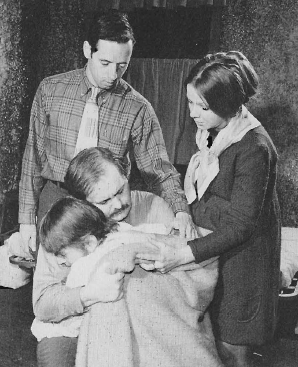
Stuart Witt, Sue Scarborough, Dennis Priest and Harry Callahan in adramatic moment from “A Hatful Of Rain” (1969-1970)
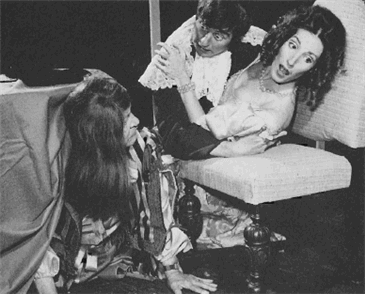
Fun and games in “Tartuffe” (1969-1970)
After summer productions of “A Midsummer Night’s Dream” and “Oklahoma!”, the 1970-71 season, Miller’s last, opened with a dazzling production of Cole Porter’s “Kiss Me Kate,” arguably the best score ever written for the musical theatre. John Miller and Harry Callahan co-directed. Miller and his wife Helen played the leading roles with Tony Federici and Carol Sloane, the jazz singer, in featured parts.
“Look Back in Anger” (opening December 2, 1970) had in its cast Art Anderson, Susan Scarborough, Margaret Burns, Charles Parker and Ann League. “Still timely today,” The Times said of the play, written in the mid-50s by John Osborne, one of England’s “Angry Young Men.”
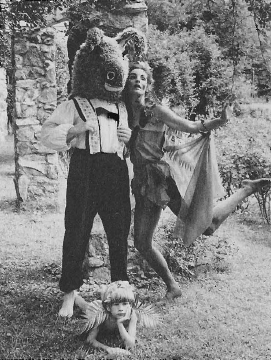
Publicity photo for “A Midsummer Nights Dream” (1970-1971)
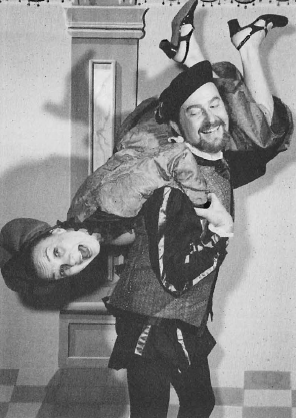
From “Kiss Me Kate” (1970-1971)
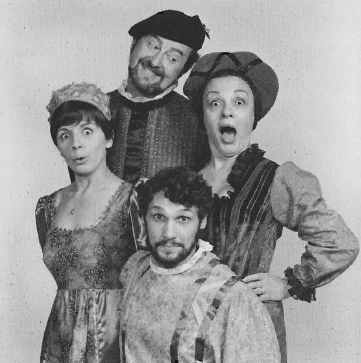
From “Kiss Me Kate” (1970-1971): clockwise, John Miller, Helen Miller, Tony Federici and Carol Sloane
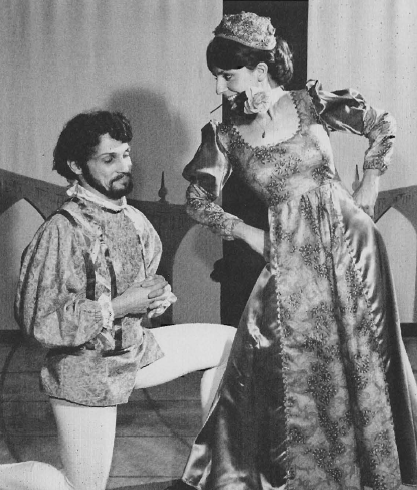
From “Kiss Me Kate” (1970-1971)
It was on January 16, 1971, that The News and Observer broke the story that may have provided more drama than all the rest of the Little Theatre season combined. Bill Morrison’s story began this way:
“John Miller, director of Raleigh Little Theatre for three years, has been dismissed effective May 31, the day his current contract ends.
“…The board’s decision, according to Miller, was based on the belief that the theatre needed a manager-director rather than a director-manager
“‘That was their explanation. They didn’t say much more, and I didn’t ask for much more,’ Miller said. ‘I thanked them and left. They wanted me to keep it under my hat, and they also offered me the chance to resign, but I didn’t think that was right.'”
Davetta Steed, president of RLT, told the reporter, “The Raleigh Little Theatre board voted to advise Mr. Miller that his present contract could not be renewed when it expires on May 31 of this year. He was given the opportunity to resign.
“The causes behind the board’s vote are considered by me to be strictly confidential — between the board and Mr. Miller.”
Reaction to Miller’s dismissal was swift in coming and reported in detail by the Raleigh newspapers.
Technical Director Harry Callahan and executive secretary Helen George both resigned to protest the firing, as did Gurdine Bliss, editor of The Playbill. Miller’s supporters held meetings, seeking a way to get the director rehired, and a newspaper editorial called for talks between opposing parties in the theatre.
In the February 1971 issue of Fanfare, the newsletter sent to RLT members, Mrs. Steed commented on the incident: “The Raleigh Little Theatre has been embarrassed by the unfortunate, premature publicity that immediately followed the January meeting of the board of directors…. This is not the board’s way of communicating with its membership, and we deeply regret that circumstances did not permit making these actions known to you at the proper time and through proper theatre channels.
“The decision not to renew the director-manager’s contract, and to offer him the opportunity to resign, was not made in haste by the board of directors, which has the responsibility of managing the affairs and business of this non-profit community theatre…. The final action, which was recommended by the executive committee, was passed by majority vote of the board — 15 for the recommendation, six against, with three members absent.”
On February 19, 1971, The Raleigh Times reported a statement by Smedes York, RLT president-elect, saying that Miller “has made a great contribution to the life of the Raleigh Little Theatre. This has been a direct result of his artistic talent and intense dedication to the creative aspect of the theatre.”
“His contributions in this area are to be commended. During this period of service, Mr. Miller’s integrity and moral standards have been a credit to our community.
“…Although the board fully acknowledges the importance of the creative aspects of the position, it is imperative that proper emphasis be given the administrative responsibilities.
“To insure the continuance and growth of the Little Theatre, the board of directors is, therefore, compelled to seek the services of a person who can bring the theatre these needed qualities as well as the creative talents.
“This decision was made as a positive step toward the overall improvement of the Raleigh Little Theatre. It is in no way a reflection on the artistic ability, the integrity or the moral character of Mr. Miller”
After the uproar over the John Miller dismissal, the rest of the season might have seemed anti-climatic, but it went off as scheduled and drew praise.
“A Flea in her Ear” (opening February 10, 1971) had Raymond Dew and Susan Thompson in leading roles with a supporting cast that included Mary Lyman, Roy Dicks, Gordon Kelley, Benton Reavis, Mary Munger, Stan Serxner, Jack Harmon, Carol Patt, Joe Kahn, Orville Barnes, Gloria King and Stephen Gehlbach. The Times said of the French farce: “This potion goes down quickly and easily and may even tickle your funnybone on the way.”
“Harvey” (opening March 24, 1971) featured Don Roberts in the leading role of Elwood Dowd, and a supporting cast that included Doris Boggs, Roland Lashley, Bob Dean, Glenn Miller, Jean Chappell, Lorena Goodwin, Sharon Spinneford, Frank Anderson, and Bob Armstrong. When Joan Munger had to leave the cast because of her father’s illness, she was replaced by Mary-Fran Lyman. “Another successful production,” said The Raleigh Times.
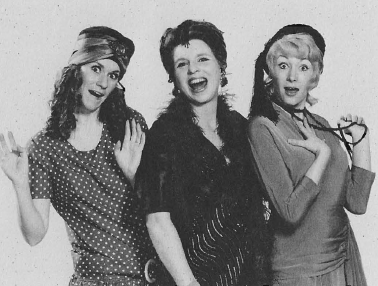
Gloria King, Mary-Fran Lyman and Susan Thompson in “A Flea In Her Ear” (1971)
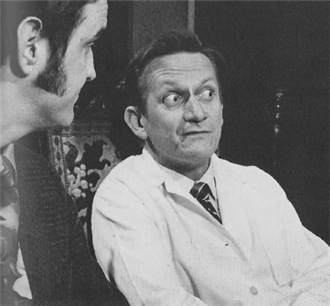
Roland Lashley in “Harvey” (1970-1971)
The season’s finale was an original musical, “The Scandalous Mrs. Jack,” with music and lyrics by Lee Wing of Durham and book by Mary Mack of Chapel Hill. Connie Moses, Carol Sloane and John Miller took leading roles. (Miss Sloane replaced Connie Moses, who had been hurt in an auto accident, for part of the run.) “Entertaining, witty and easy to sit through,” said The Times’ reviewer.
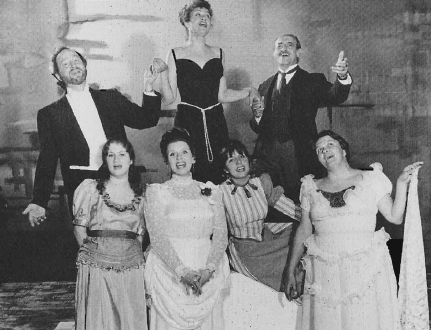
From “The Scandalous Mrs. Jack” (1970-1971)
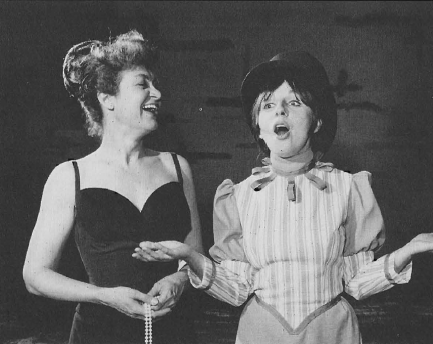
Connie Moses, left, and Carol Sloane in “The Scandalous Mrs. Jack” (1970-1971)
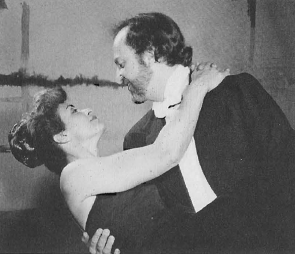
Connie Moses and John Miller in “The Scandalous Mrs. Jack” (1970-1971)
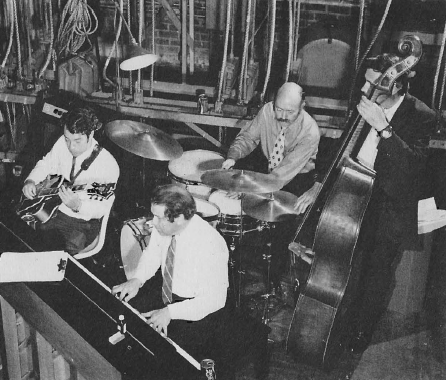
Paul Montgomery’s Combo, who backed “The Scandalous Mrs. Jack” (1970-1971)
Footnote: Harry Callahan has gone on to become head of the drama department at St. Mary’s College in Raleigh. John and Helen Miller live in New York City; he performs in professional theatre, and she teaches voice.
The Raleigh Little Theatre had survived one of the most traumatic episodes in its history. But there were scars, and it would take time for them to heal.
Meantime, the show must go on. Ahead was a new director, a new season, a new set of challenges.